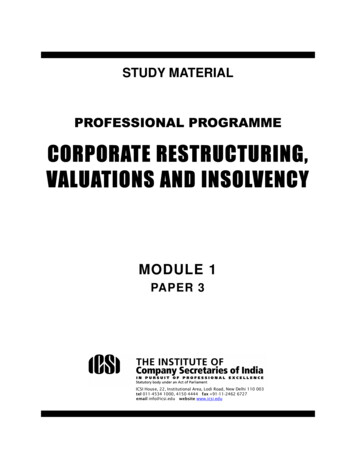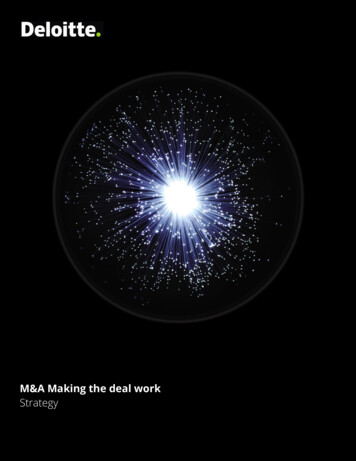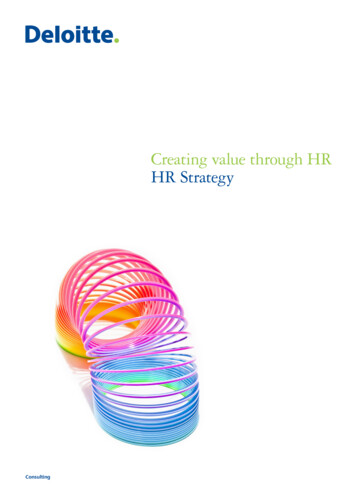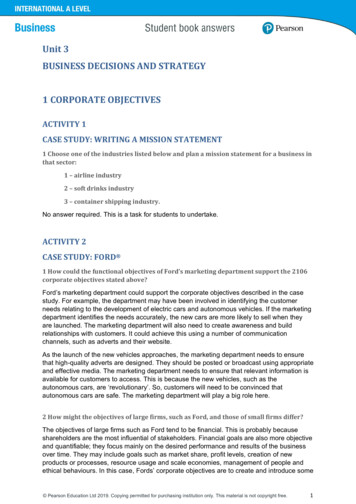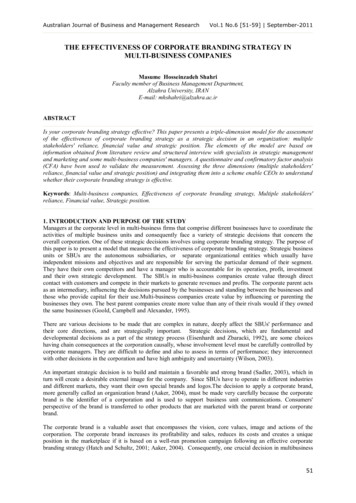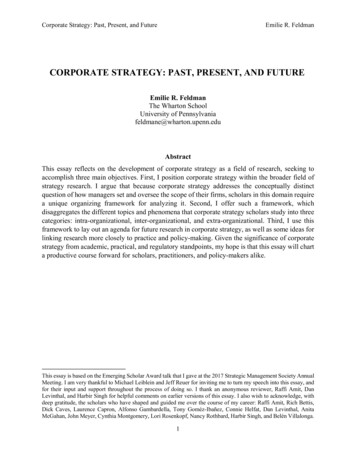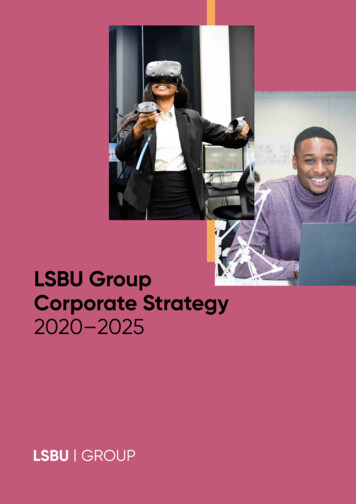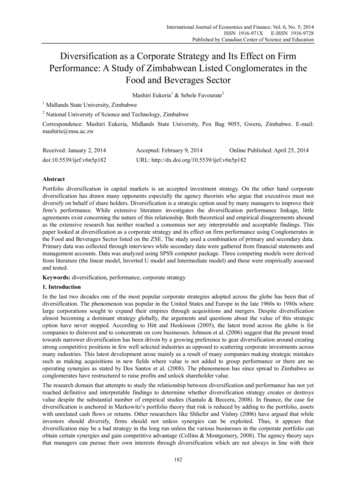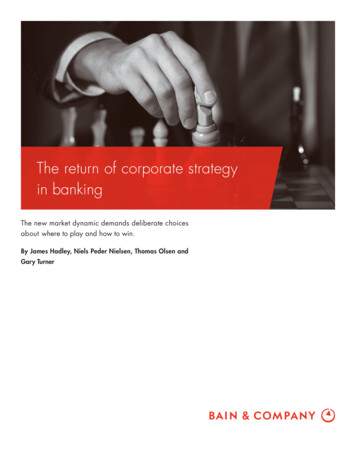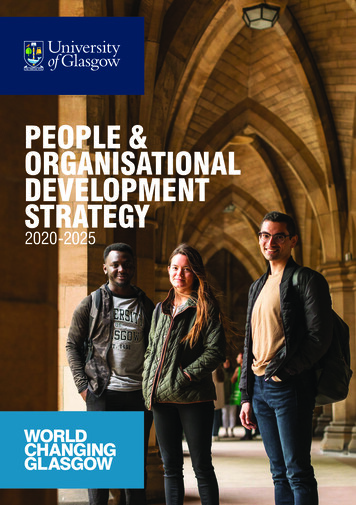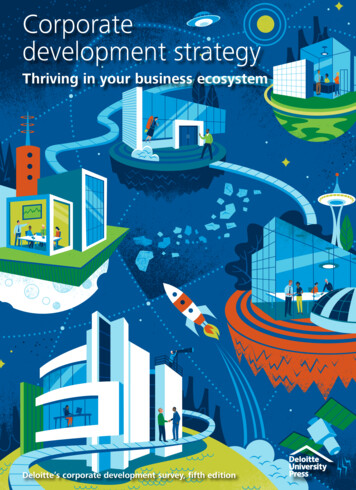
Transcription
Corporatedevelopment strategyThriving in your business ecosystemDeloitte’s corporate development survey, fifth edition
Corporate development strategy: Thriving in your business ecosystemDeloitte AdvisoryDeloitte Advisory helps organizations turn critical and complex business issues intoopportunities for growth, resilience, and long-term advantage. Our market-leadingteams help clients manage strategic, financial, operational, technological, andregulatory risk to maximize enterprise value, while our experience in mergers andacquisitions helps clients move forward with confidence.Deloitte’s M&A ServicesDeloitte’s Merger and Acquisition professionals advise strategic corporate buyersand private equity investors throughout the entire M&A deal life cycle. Fromstrategy development and target screening through transaction execution,integration, and divestiture, our M&A professionals have the domain knowledge,extensive industry experience, and global reach to provide a tailored approach andhelp build value for clients.
Deloitte’s corporate development survey, fifth editionAbout the authorsChris Ruggeri is a principal with Deloitte Transactions and Business Analytics LLP and is aleader of Strategy & Innovation. She has more than 25 years of experience in M&A focused onadvising public and private companies, boards of directors, and special committees on negotiated and unsolicited transactions. She helps clients understand the value of business enterprisesand associated key value drivers and risk factors. Ruggeri is a principal author of Deloitte’s MarketValue Creation and Investor Relations point of view, and leads Deloitte’s focus on corporatedevelopment effectiveness.Sara Elinson, a principal in Deloitte Transactions and Business Analytics LLP, leads the Transactionand Modeling Advisory practice within Deloitte Advisory. She focuses on helping clients achievetheir strategic objectives through the use of modeling and financial analysis. She has more than 15years of experience advising public and private company executives on M&A and other strategicinvestment decisions. Elinson also advises boards of directors on transactions through the provisionof fairness opinion services.Ken Kirschner, a partner with Deloitte & Touche LLP, is the US leader for the Technology, Media& Telecommunications M&A Transaction Services practice. He has more than 27 years of publicaccounting experience, with almost 20 exclusively in M&A. Kirschner has led hundreds of domesticand cross-border deals and has advised leading private equity as well as corporate buyers and sellerson the due diligence, accounting structuring, and financial reporting aspects of transactions, including related contract and financing matters.Tony Blanchard is a managing director with Deloitte Corporate Finance LLC, where he helps leadthe industrials sector team as well as Corporate Divestiture and Strategic Growth Services initiatives. Blanchard has over 15 years of investment banking and corporate finance advisory experience.Over this time, he has advised on more than 90 M&A transactions representing approximately 12.5 billion in transaction value, including more than 50 cross-border transactions representingover 4.2 billion in transaction value. Blanchard has represented both buyers and sellers of privatelyheld companies and subsidiaries or divisions of public companies.
Corporate development strategy: Thriving in your business ecosystemAcknowledgementsThe authors would like to thank Rich Rorem, Hector Calzada, and Michael Rachlin for theirsignificant contributions and insights. We would also like to thank Angela Hoidas, Sarah Long,Junko Kaji, Angie MacPhail, and Shelley Pfaendler for their guidance in helping to make thispiece a reality.
Deloitte’s corporate development survey, fifth editionContentsThe continuing evolution of corporate developmentInnovation through M&A 26Partnering with the businessDeal origination 12Making yourself irresistibleShareholder activism 18Investors flex their musclesInvestor relations 24Corporate development’s hidden assetAppendix 27Profile of survey respondentsEndnotes 29Contacts 301
Corporate development strategy: Thriving in your business ecosystemThe continuing evolution ofcorporate developmentTHE recent surge in M&A activity meansthat corporate development teams areworking harder than ever. The catch is thathard work may not be enough. To create successful transactions, today’s deal environmentdemands new levels of creativity and forwardthinking from corporate development professionals. Whether the question is where tofind targets, how to structure terms, or whenand what to communicate with shareholdersabout a transaction, one sure answer is thatwhat worked yesterday may need to evolve andadapt to an increasingly fast-pacedand ever-evolvingenvironment tosucceed tomorrow.As we explore inthis report, innovation has become acore need for justabout any companyin any industry. Alarge majority—nearly two-thirds—of the 357 corporate development professionalswho responded to our survey are being tappedto help fill this need. The path to succeedingin this mission starts with challenging somesacrosanct concepts embedded in traditionalcorporate development processes. Instead ofthinking about corporate development as filling gaps in a product portfolio or geography,for instance, it may be time to break free fromconventional organizational charts and look atthe enterprise as a dynamic platform of valuable assets, where the objective is to consider avariety of transaction alternatives and businesspartners, some outside traditional industrynorms, that can be grown and monetized indifferent ways, with different combinations ofpartners or transactions. Rather than pass onan early-stage asset because it doesn’t fit standard transaction profiles, consider for example,creating a strategic option by incorporating itas a partnership or as a venture-capital typeof investment. Conventional approaches tostimulate deal flow may not be adequate to create the types of opportunities that will leveragethe value of the business platform and createcompetitive separation. And when it comesto negotiating, themind-set of winningand walking away isquickly becomingpassé, as the benefitsof long-term partnerships with founders and specialistsbecome clearer.In parallel withinternal challenges toinnovate, corporatedevelopment professionals should also rethink how to handle therising tide of external pressure from increasingly activist shareholders: not just activisthedge funds but shareholders of all stripes whoare increasingly inclined to express their viewsand preferences about the strategic directionof businesses they invest in and the businesses’performance. As headlines suggest, and oursurvey respondents confirm, activist agitation is driving higher deal volumes and dealvalues. Developing constructive dialogues withinvestors and helping them gain confidenceand understand actions corporate executivesare taking to help optimize value within theInnovation has becomea core need for justabout any company inany industry.2
Deloitte’s corporate development survey, fifth editioncorporate portfolio of assets and businessesare becoming nearly as important as creating arobust transaction in the first place.Push and pull, corporate development ismoving into a new era. Yes, the playbooks,technical competencies, repeatable deal disciplines, and governance structures companieshave honed over the past few decades are stillessential—but these fundamentals are no longer sufficient to seize market opportunities thatmay be amorphous where new business models or ways of doing things need to be defined.This reflects rapidly evolving ecosystems andthe increasing impact of technology on allindustries, which is redefining competitor andbusiness partner behavior and the opportunity set. What should be considered now forsuccess is fresh thinking, a high tolerance fordisruption, and the ability to be nimble andquick to convert change into an opportunityfor value creation.Innovation through M&A:Partnering with the businessOur latest corporate development survey reveals that the pursuit of innovation istransforming the M&A world. Roughly twothirds of corporate development leaders whoresponded to the survey say their function hasbecome a more important source of innovationover the past two years, and nearly 60 percentof executives believe the volume of innovationcentered deals will increase over the next twoyears. Industry ecosystems are expanding andnontraditional participants are entering themix, creating both threats and opportunities.Examples abound, with, for example, technology companies making their mark across abroad range of industries.Disruption arrives in different forms foreach industry. The challenge for corporatedevelopment teams now is how to handle thenew worlds they face. The skills and technicalexpertise that teams have honed in past yearsare still essential, but should now be complemented with a knack for creativity and flexibility. In some cases, it may mean knowinghow to take a hazy business model and shapeit into a deal opportunity. This can be particularly daunting for corporate acquirers sincenew business models can be perceived as riskyand can, therefore, discourage establishedacquirers from their pursuit. Becoming moreaccomplished risk managers is an increasinglyvaluable part of the corporate developmenttool box.In striving to achieve excellence in a newage, leaders should take stock of the specificnew capabilities their teams will need. Mostlikely, this list will include new methodologiesand tools to assess cutting-edge companies thatoften lack traditional metrics or where businessmodels are yet to be defined and therefore diligence focused on past performance may havelimited value in evaluating future performanceexpectations. New deals will also likely requirenew subject matter specialization. Similarly,due diligence processes will also have to morphto adapt to the unique risks associated withan innovative transaction. One major risk ofacquiring an early-stage business, for example,is that the founding team leaves, taking with itvaluable intellectual property.Corporate development professionals willalso have to adapt to new deal structures thatmay not include the levels of ownership orcontrol they’re accustomed to. Innovative firmsare often the product of passionate entrepreneurial teams that may stipulate stayinginvolved operationally or financially with theirorganizations as a main condition of a deal.Innovation is not easy, but with it maycome an unprecedented opportunity forcorporate development teams to add value totheir enterprises in outstanding ways. Strongleaders who can adapt to the new environmentmay stand to see great results, and with them,great rewards.Deal origination: Makingyourself irresistibleKeeping the deal pipeline filled is a perpetual task for acquisitive companies. The challenge, in a nutshell, is how to effectively create3
Corporate development strategy: Thriving in your business ecosystema proprietary deal pipeline without exhausting all of corporate development’s resources.A company’s own employees are generallyexpected to be the source of the most successful deals, in executives’ opinions, but few canafford to devote enough time to originationand the ongoing development of relationshipswith potential sellers. Even at the most experienced dealmakers, fewer than half of the deals(45 percent) come through employees.To stay competitive, many companiesare focusing on an alternative, less resourceintensive route to good acquisition candidates:drawing entrepreneurial targets to them. Thistactic of building a magnetic corporate reputation attempts to prompt sellers to proactivelyapproach a company rather than a buyer standing in line with the rest of its competitors to geta bite at the apple. Some 60 percent of corporate development leaders say they are investingin being perceived as preferred acquirers.Developing that kind of positive reputationmeans companies can create a strong presence in the communities that matter to theirindustries. From attending conferences tosetting up satellite offices, the goal is to buildlong-term relationships and to be seen as partof the fabric of the community. At the sametime, corporate development professionalsrequire new levels of flexibility within dealmaking parameters to be nimble when opportunities arise. Teams that are bogged down bycorporate bureaucracy may find they lose outon attractive targets that do not want (or need)to conform to standard ways of doing things.Behind the scenes, companies may also wantto consider investing in specific technologies tomanage their deal pipelines and relationshipsmore efficiently.Ultimately, corporate development leaderswill need to balance deal origination resourcesbetween direct and indirect approaches.Those who can juggle well may stand to see anevergreen pipeline of viable deal opportunities; those who sit back and expect to find gooddeals the same way they did 10 years ago willlikely miss out.4Shareholder activism:Investors flex their musclesShareholder activists are making theirmark on M&A. This year’s corporate development survey found that nearly 60 percentof corporate development leaders see shareholder activism affecting transaction activityin their industry. Reinforcing this sentiment,nearly a quarter (24 percent) of respondentssay their own companies are more likely toengage in M&A transactions as a result ofactivism. The recent wave of shareholderactivism has emboldened many investorsof all stripes to assert their views when itcomes to how companies deploy capital andmanage performance.Historically, when activists have circled thegates, they’ve often advocated for companies todivest assets in some form: to sell nonoperatingassets, split up their enterprises, or undo pastacquisitions. Effective preparation for companies should include having a compre
Corporate development strategy: Thriving in your business ecosystem 4 a proprietary deal pipeline without exhaust-ing all of corporate development’s resources. A company’s own employees are generally expected to be the source of the most success-ful deals, in executives’ opinions, but few can afford to devote enough time to origination and the ongoing development of relationships with .

